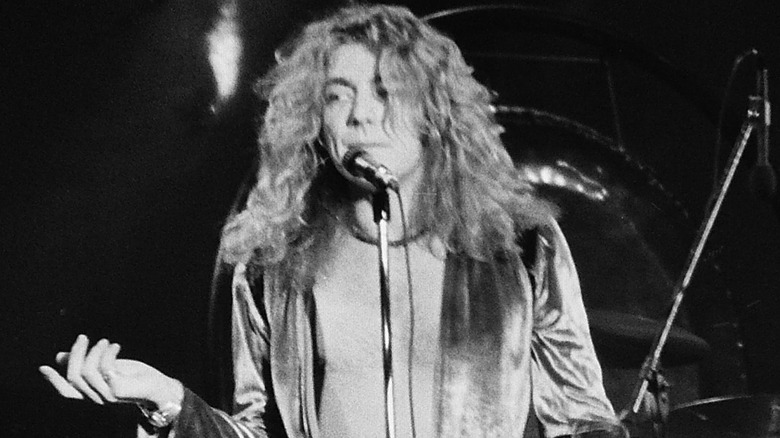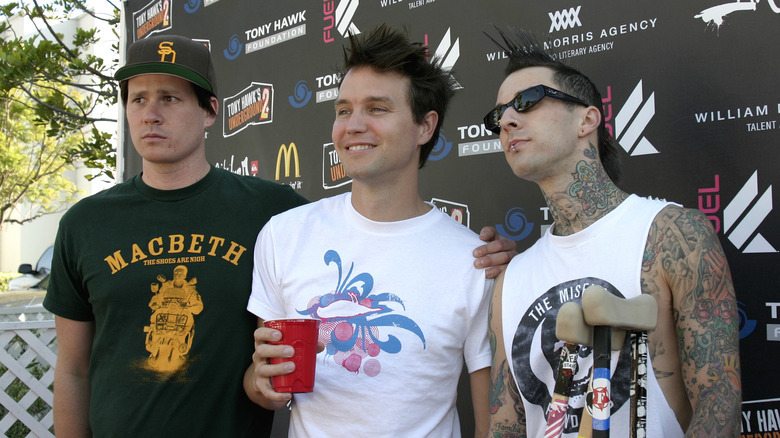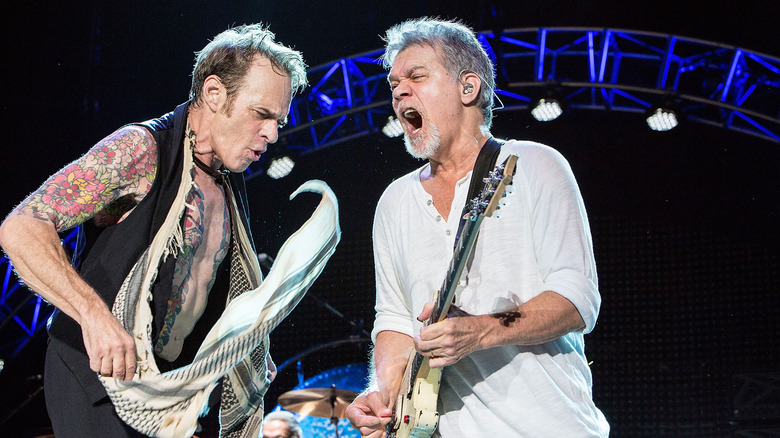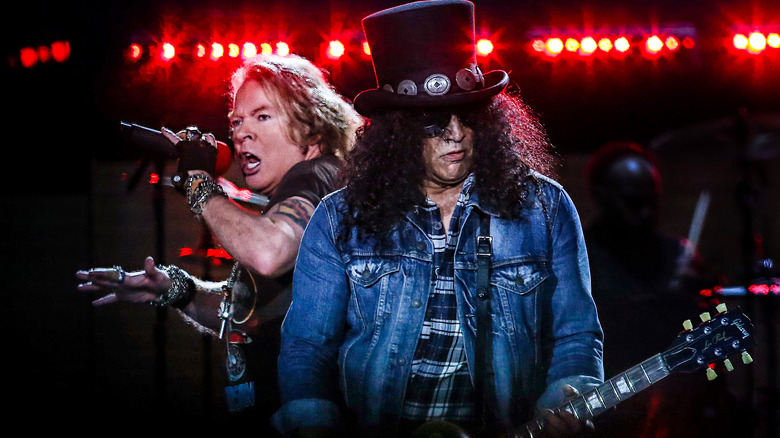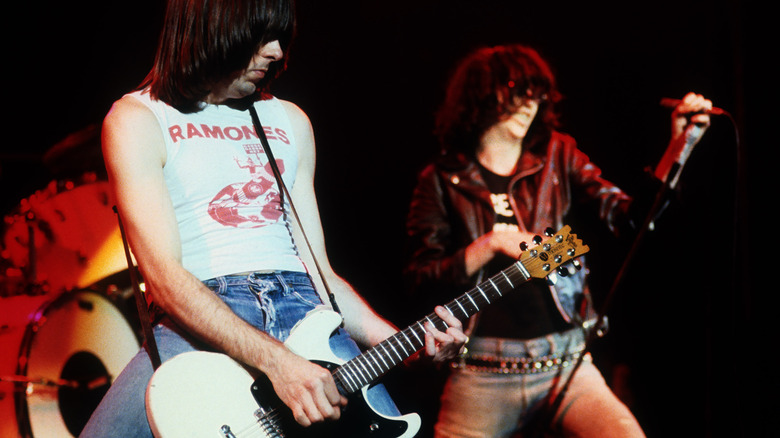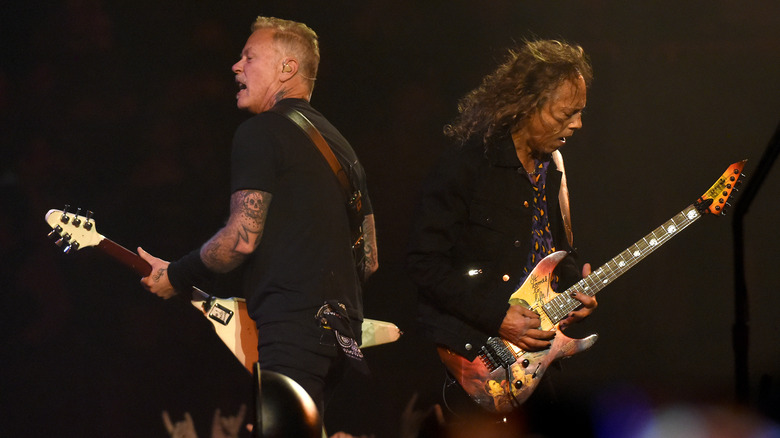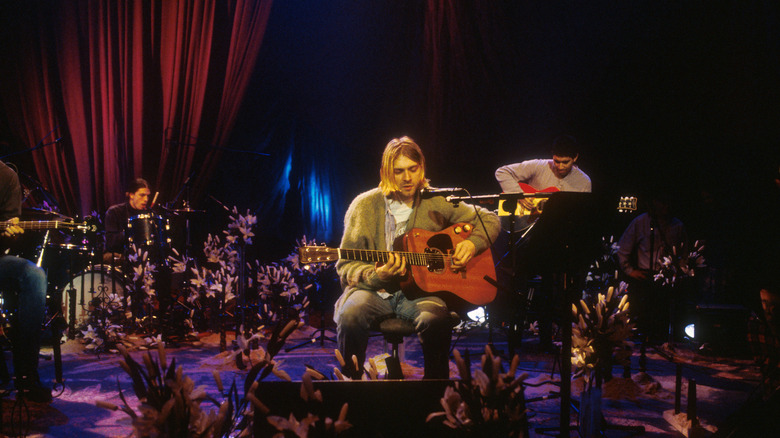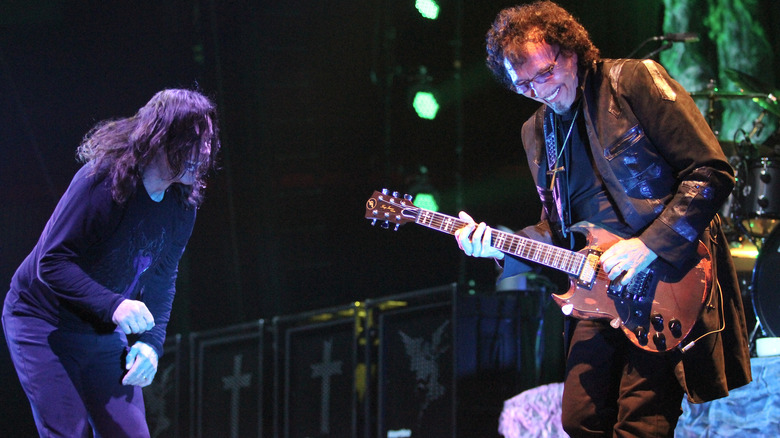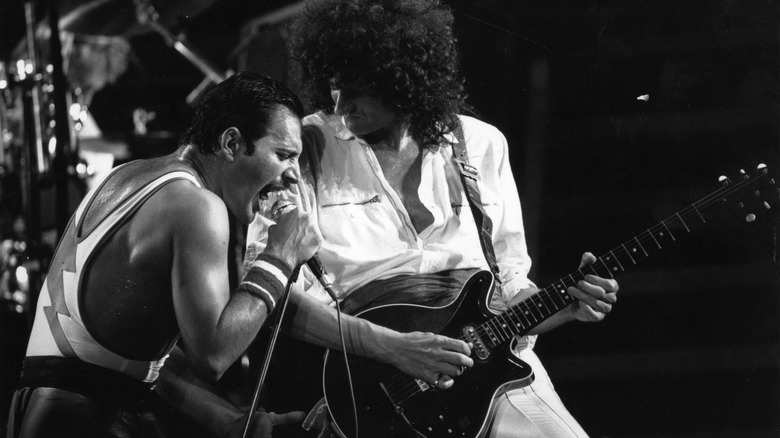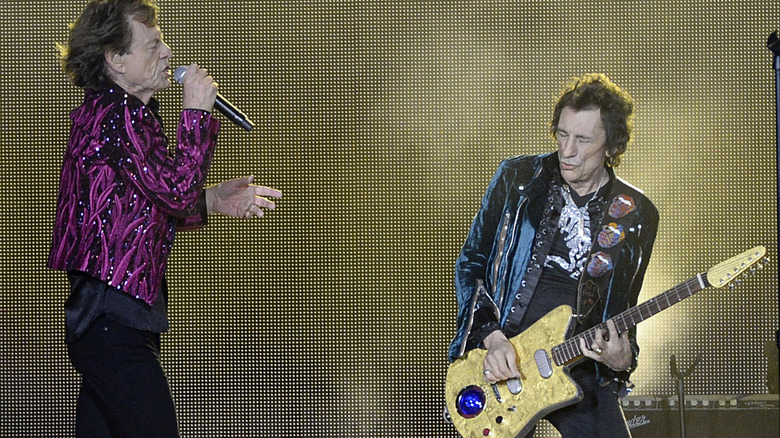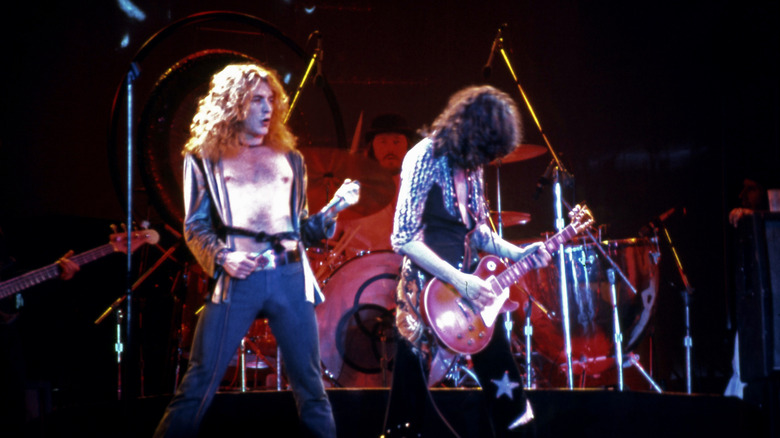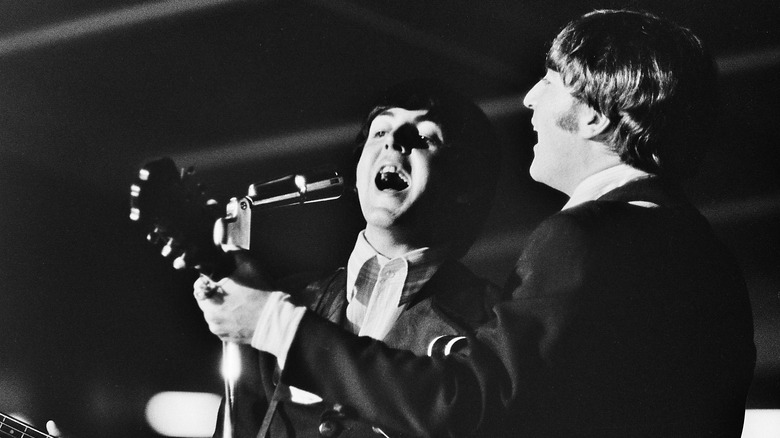The Most Influential Rock Bands Of All Time
Rock has as broad and deep a legacy as any musical genre. It started as a riff on old blues and gospel music. Then it exploded in the late '50s and early '60s, and artists incorporated elements of swing, folk, and jazz. Then came the British Invasion, followed by the rapidly growing genre splintering into folk rock, southern rock, hard rock, punk rock, heavy metal, grunge, alternative, and countless subgenres within those subgenres. Every rock fan has their favorite style and their favorite bands within that style. They don't agree on much, except that trying to determine which band is best is a fool's errand.
That being said, certain rock bands have had such an enormous impact that it can't be ignored, even by fans of other subgenres. Some influential bands changed how songs were written, popularized underground genres, invented those genres wholesale, had huge influences on fashion or artists outside their genre, and even redefined what was possible with music in the first place. So what are the most influential rock bands of all time? Here is a decidedly non-exhaustive list.
Blink-182
Don't let their toilet humor fool you — this irreverent SoCal trio is the real deal. Their hooks are infectious. Whether it's Mark Hoppus and Tom DeLonge or Mark Hoppus and Matt Skiba, that twin lead-singer attack is something else. And there's a reason Travis Barker is the most in-demand drummer in the biz.
Blink-182 released three records in a row (via AllMusic) — 1999's "Enema of the State," 2001's "Take Off Your Pants and Jacket," and 2003's "Blink-182" — that are packed with smash hits and fan-favorite deep-cuts, with skippable clunkers nowhere to be seen. Each album produced enough material to retire or tour on, but three pop punk masterpieces in a row made the band legends. As MTV notes, nearly every successful mainstream rock act of the 2000s, from Paramore to Fallout Boy to Jimmy Eat World, took notes from Blink. It's a legacy not even their tumultuous later years, as detailed by Rolling Stone, and more lukewarmly received releases like 2011's "Neighborhoods" and 2016's "California," can ever undo.
The band might not be for everyone. But their influence cannot be ignored, and neither can the fact that all these years later, "All the Small Things," "First Date," and "Miss You" still bring down the house like nobody's business.
Van Halen
Heavy music wasn't doing well at the end of the '70s. Lots of legacy hard rock bands were losing members or "entering the last phases of their career," according to Loude. The radio was filled with disco and pop. Barely a decade into its existence, hard rock felt old and tired.
But there was one Californian four-piece that was on a mission to keep the genre alive. "Van Halen," and their eponymous 1978 debut, was just the shock the system needed, according to Ultimate Classic Rock. Michael Anthony's supporting falsetto was an essential component to the band's earworm choruses. Singer David Lee Roth understood this was the entertainment business before it was anything else. He was the ultimate front man: a comedian and an acrobat as well as a singer, and someone who demanded and held your attention until he was bored of you.
Meanwhile, millions of kids were holed up in their rooms, skipping homework to listen to Eddie Van Halen shred "Eruption" just one more time, and then another time after that, until the tape wore out. As Rolling Stone points out, few guitar virtuosos have inspired as many imitators. In their later years, not even Roth's departure could stop the band from churning out hits with vocalist Sammy Hagar.
Although they predated hair metal, Roth himself believed that '80s subgenre only existed because they provided its look and attitude, according to Iheart.com, and proved that metal could be actually be fun.
Guns N' Roses
The speed with which people abandoned the lipstick and cheesy, over-processed ballads of hair metal for the grittier sounds of Guns N' Roses, as per Revolver, indicates folks were ready for a change when "Appetite for Destruction" — still the biggest debut ever (via WRAT) — took the world by storm.
GN'R offered the right sound at the right time and combined every attribute that made their peers successful. They had Bon Jovi's looks, Def Leppard's songwriting brilliance, Metallica's street cred, Motley Crue's legendary, hotel-trashing debauchery, and Nirvana's influence. They also had cross-appeal none of those peers could match. Early hits like "Sweet Child O' Mine" and "Welcome to the Jungle" merged the catchy pop sensibilities that attracted glam metal fans with the raw, furious danger that drew in the headbangers. In few other group's audiences could Poison and Megadeth fans be found side by side.
In the early '90s, this phenomenon expanded. Rolling Stone recalls when Axl Rose played "November Rain" with Elton John, while guitarist Slash wrote and toured with Michael Jackson, according to Ultimate Classic Rock. Then the band split the bill with the likes of Metallica, Skid Row, Faith No More, and Soundgarden during their "Use Your Illusion" tour (via Triple M). Not many hard rock group could be so at home with such a diverse array of artists.
Not even the group's infighting or Axl's mismanagement of the brand when he was its sole original member dampened their mighty legacy (via MTV), or, as Loudwire points out, depressed turnout for their blockbuster, stadium-packing reunion tour in 2019.
The Ramones
The Sex Pistols might have given punk rock its iconic look and attitude, and the Clash maybe carried the torch from there, as per Esthetic Lens, but as Live About notes, the genre was started by four mop-haired, leather jacket-wearing Americans playing an entire set's worth of songs in 20 minutes flat at CBGB in New York. Their names were Joey, Johnny, Dee Dee, and Tommy. You probably know them better by the stage name they all shared: the Ramones.
The short length of their songs has almost become notable. But their tracks didn't need to be 5 or 6 minutes long. They packed plenty of energy into two, as The Guardian notes — and getting straight to the point as crudely and impactfully as possible, with no fat to trim, is kind of the entire point of punk. This approach stood out like a sore thumb in an age when rock songs were getting longer, more elaborate, and, honestly, more boring. Folks who had no time for disco, acoustic ballads, or institutionalized rock monoliths noodling endlessly over 9-minute songs found themselves right at home in the dank, dark basements of graffiti-smeared clubs.
But as Kerrang notes, the Ramones' influence didn't stop at punk. Their songs have inspired artists in multiple genres, been featured in countless soundtracks, and even inspired horror writers. And spend any time around other people and you'll almost certainly run into a Ramones shirt before too long.
Metallica
Luckily for '80s headbangers who weren't sufficiently thrilled with the heavy music of the day, Guitar World notes that another lane did exist. Thrash metal enjoyed little mainstream success until the early '90s, but the underground is exactly where its fans wanted it. It could stay true to itself there, away from the prying, meddlesome fingers of MTV and big label A&R reps who would no doubt try to get Megadeth and Slayer to trade in their ripped jeans for lipstick, their aggressive speed for marketable hooks, and their dark, political lyrics for songs about fast cars and loose women. No, word of mouth and fan loyalty was sufficient, thank you very much.
There were many popular underground metal bands, but Metallica were the undisputed kings, claims The Guardian. Their 1983 debut, "Kill 'Em All," already had their contemporaries playing catch up. The following year's "Ride the Lightning" saw them mature greatly as writers. But 1986's "Master of Puppets," named after a title track about addiction, according to Rolling Stone, is where they truly came into their own as experts at their craft. Two years later they produced "... And Justice For All," also an acclaimed record, and in 1991 they exploded into the mainstream, according to Ultimate Classic Rock, with their self-titled "Black Album."
By that time hair metal had declined, and the road was clear for Metallica to complete its conquest of metal. As evidenced by their uncountable stylistic descendants and a string of No. 1 albums, as per Billboard, they have yet to be dethroned.
Nirvana
Metallica, Guns N' Roses, U2, the Red Hot Chili Peppers, Soundgarden, Pearl Jam, and R.E.M. all released landmark records in the span of a few months in 1991, according to Loudwire. Initially buried in this epic mix was an album that would come to define the era better than any other: Nirvana's "Nevermind." Defined by the so-called "Seattle sound," more popularly known as grunge, as per Scroll Magazine, the record shunned the virtuosic musicianship that characterized rock of the day in favor of power chords, raspy vocals, simple beats, and guitar solos that were so short and sloppy they might've been satirizing everything tortured frontman Kurt Cobain felt was wrong with rock.
"Smells Like Teen Spirit" is obviously the essential song here, but the whole album is required listening for anyone who wants to understand how and why everything about the '80s suddenly seemed so uncool heading into 1992. Cobain believed rock should hold itself to a higher standard than mindlessly shredding over vapid lyrics. All music should speak to the soul, as Udiscovermusic relates. He set out to spread this gospel, and in his short life succeeded in splitting the history of rock in half (as per FiveThirtyEight). Behind him laid what most would consider "classic" rock; ahead was the genre's modern era. Whether his angsty grunge revolution had a good or bad impact on music comes down to personal preferences. But the importance of a band that almost single-handedly overhauled the landscape of music, and in so little time, cannot be denied.
Black Sabbath
Many bands can claim to be influential, but few can claim to be as singularly influential as Black Sabbath, who birthed the genre of metal, according to Rolling Stone. Led Zeppelin at least had help from the Kinks and The Who when forging the sound of hard rock. But without Sabbath, there would be no Judas Priest, no Iron Maiden, no Metallica, no Pantera. We could go on, but you get the point.
While the importance of Sabbath to music and culture in general is now understood, at the time, nobody knew what to do with them. In fact, they didn't know what to do with themselves. As Rolling Stone details, once called Earth, they initially focused on playing simple, blues-based rock with a psychedelic twist. But it wasn't until bassist Geezer Butler's nightmare, in which he saw a shadowy figure in his room, that the band fully leaned into the darkness. He told his bandmates, Ozzy Osbourne penned the lyrics "What is this that stands before me?" from the band's haunting eponymous single, and the rest is history.
Osbourne's haunting wails. Bill Ward's thunderous, foreboding drums. Tony Iommi's iconic riffs. It's a blueprint that's been copied ad nauseum since. But that's the point. Sabbath gave this dark gift to the world, according to the Rock N' Roll Hall Of Fame, and its stylistic children flew the nest and turned it into a vast, rich art form and a way of life.
Queen
It's one thing to be a great lead singer, and it's just as important to know how to work an audience. But Freddie Mercury's ability to hold a crowd in the palm of his hand was something bordering on magic, as Triple M points out. They moved and swayed and jumped and danced when he did, almost like they were an extension of his body. He would often lead the crowd in vocal warmups. Imagine a lesser performer trying that. But Mercury made it something truly intimate and special.
Then he would launch into one of the band's many, many rock hits, infused with pop sensibilities and even operatic overtones. Whatever tune it was, there's a chance John Deacon anchored it with a groovy bass line. Roger Taylor joined him in the rhythm section on drums, sometimes supporting Mercury with backing vocals, and almost certainly was good enough to front his own rock band. But being in one with Mercury is far better. Then there's Brian May, whose soaring guitar licks were almost as integral to the classic sound of Queen as Mercury's vocals themselves. Together, these four were one of the greatest musical groups of all time, according to Forbes.
USA Today says their performance at Live AID has become the stuff of legend, and rightfully so. Performances big enough to fill venues twice as large as the largest on Earth, which they frequented, were par for the course.
The Rolling Stones
The Beatles might've had the greater impact on pop music and culture, but the Rolling Stones gave rock n' roll its dark, sneering, rebellious attitude. What's strange is that comes from the stylings of gospel music. Yes, being at a Stones show is like being at a worship service. "The thing we associate with Black performers goes back to the church," wrote Steven Van Zandt for Rolling Stone. "Letting the spirit physically move you, letting go of social restraints, any form of embarrassment or humiliation. Not being in control: That's what Mick Jagger was communicating."
Jagger wasn't like other British Invasion front men. He didn't stand still and smile while he sang. He moved. And he was only half-singing, but that was by design. It was an intimate, musical conversation he was having with the listener. As for Keith Richards, and jokes about his immortality aside, it's strange for someone so well known and respected to still be so underappreciated. He's a rhythm guitarist, yes, but as Guitar.com points out, he still knows how to make every note sing, in a way that gets right to the soul of what the song is trying to convey on an emotional level.
As for culture, Udiscovermusic claims they popularized blues, influenced fashion, and wrote countless classics that still dominate classic rock radio to this day.
Led Zeppelin
Bands like Steppenwolf and the Kinks were experimenting with what would eventually become hard rock as early as the mid 1960s, as per Loudwire. The Who took that to the next level, but there was another group that would bring it all to life. The Who's own drummer, Keith Moon, would even give them their name. As legend has it (per Far Out Magazine) while playing with then-Yardbirds guitarist Jimmy Page, who explained to Moon his plans for a new rock group, Moon remarked, "that'll go over like a lead balloon."
He was, of course, very wrong: Led Zeppelin would go on to set the hard rock template for the next two decades, as Rolling Stone points out. This was a band of sometimes opposite extremes. They reached into music's past, drawing familiar influence from the blues, and yet they wrote songs in a forward-thinking way that twisted minds. Many of their hits, like "Black Dog" and "Whole Lotta Love," don't feature much speed or distortion, and yet rock harder than most songs that do. Their live performances were something of a ruse. They had the mad energy of young men speeding towards the edge of a cliff, but they were old masters at heart, and were never not in control.
Robert Plant, Page, John Paul Jones, and John Bonham had an almost spiritual connection to music — they seemed to pull raw emotion out of the ether and channel it through music in a magical way that has never been matched.
The Beatles
Did you know you can major in the Beatles, according to the BBC? It's true. Imagine spending your life analyzing each Beatles song like it contains the secrets of the universe. Now imagine, still pouring over their music all these years later, what it was like when they were still around. Maybe it's because rock was still new when they got their hands on it, but every album John Lennon, Paul McCartney, George Harrison, and Ringo Starr put out redefined what was possible. By the time their peers caught up, they had already moved on to the next thing, seemingly without trying. Rolling Stone points out that overhauling everything about music, with each release, became an expectation. But it was one the band set for themselves.
The Beatles stopped performing before they officially split up, and if you watch videos of their concerts you can understand why. The band can't do its job if the crowd is screaming louder than they're playing (per NME). But people couldn't help themselves. That's how deeply these songs touched their souls, something they're still doing. It's impossible to count the many, many ways the Beatles influenced music itself.
In that way, they can't be described as a product of their time. They defined their era, but every generation rediscovers and treasures these songs for themselves. It's the very definition of timeless: not simply aging well, but becoming a foundational cornerstone of culture itself.
